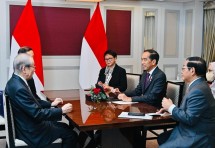National Textile Industry Growth Under the Shadow of Basic Electricity Rate Rise
By : Ridwan And Aldi Firhand. A | Thursday, February 01 2018 - 19:26 IWST

Textile Production (Illustration)
INDUSTRY.co.id - Jakarta - The government's plan to change the formula for non-subsidized electricity tariffs by including coal prices as one of the basic electricity tariff calculation components (TDL) has come under fire from textile entrepreneurs incorporated in the Indonesian Textile Association (API).
Understandably, the price of coal is smoldering. For the February contract at Newcastle today, the price of coal reaches 107.7 US dollars per ton while in the Rotter market and the price is around 90.85 US dollars per ton.
Vice President Director of PT Pan Brothers Tbk (PBRX) Anne Patricia Sutanto said the change in TDL formula has the potential to make non-subsidized electricity tariffs, including industrial electricity. The increase has a big impact because the textile industry, especially in the upstream sector requires considerable electricity.
"Later, most of which will be affected in the upstream, the highest investment in which it requires energy so it will require higher electricity than clothing or garment," said Anne at Menara Kadin Indonesia, Jakarta (31/1/2018).
Anne added, the Indonesian Textile Association (API) was observing the plan of the ESDM Ministry. He also hopes, the policy issued by the government does not burden the industry.
"We will ask the government to see benchmarks from other industries in other countries because we must be competitive from the domestic side not only domestic but also outside," he said.
According to him, so far the textile industry is dependent on exports. Meanwhile, the national textile industry is facing tough competition from neighboring countries such as Vietnam which is very efficient, especially in terms of workers' wages.
"The government should encourage the national textile industry to compete in the global market, we must ensure that our industry of Indonesia industry can really compete domestically and abroad," said Anne.
For that, continued Anne, it also considered to discuss with the Ministry of Industry regarding this new policy plan. "This discussion also analyzes the impact of electricity tariff increase on textile industry," he said.
Read Also
Today's Industry

Jumat, 02 Mei 2025 - 10:46 WIB
Binawan and Government Support Indonesian Nurses in Europe through Scholarships
In the midst of the viral #KaburAjaDulu hashtag as a symbol of the young generation's disappointment with domestic working conditions, Binawan responded with real action: dispatching Indonesian…

Jumat, 28 Maret 2025 - 22:21 WIB
SUNeVision Initiates MEGA IDC Phase Two Development
SUNeVision, the technology arm of Sun Hung Kai Properties (SHKP), today announced the commencement of construction for Phase Two of MEGA IDC in Tseung Kwan O. As Hong Kong's largest data centre…

Jumat, 28 Maret 2025 - 22:07 WIB
TDL Records New Revenue Record of IDR 25 Trillion in 2024 Ahead of 50th Anniversary
PT Metrodata Electronics Tbk (MTDL), the largest technology Company with the most complete IT and telecommunications products in Indonesia, managed to record a revenue of IDR 25 trillion in…

Jumat, 28 Maret 2025 - 22:00 WIB
Wireless Logic Selected By Thales As IoT Connectivity Partner
Wireless Logic, a global leader in IoT connectivity solutions has been selected by Thales, a global leader in advanced eSIM technologies, to enable secure, scalable and resilient IoT connectivity…

Jumat, 28 Maret 2025 - 21:53 WIB
Microvista Expands International Presence with Mobile CT System ScanExpress
The German specialist in industrial computed tomography and non-destructive testing, Microvista, announces the European expansion of its innovative mobile CT system, ScanExpress. The system…

















News Comment